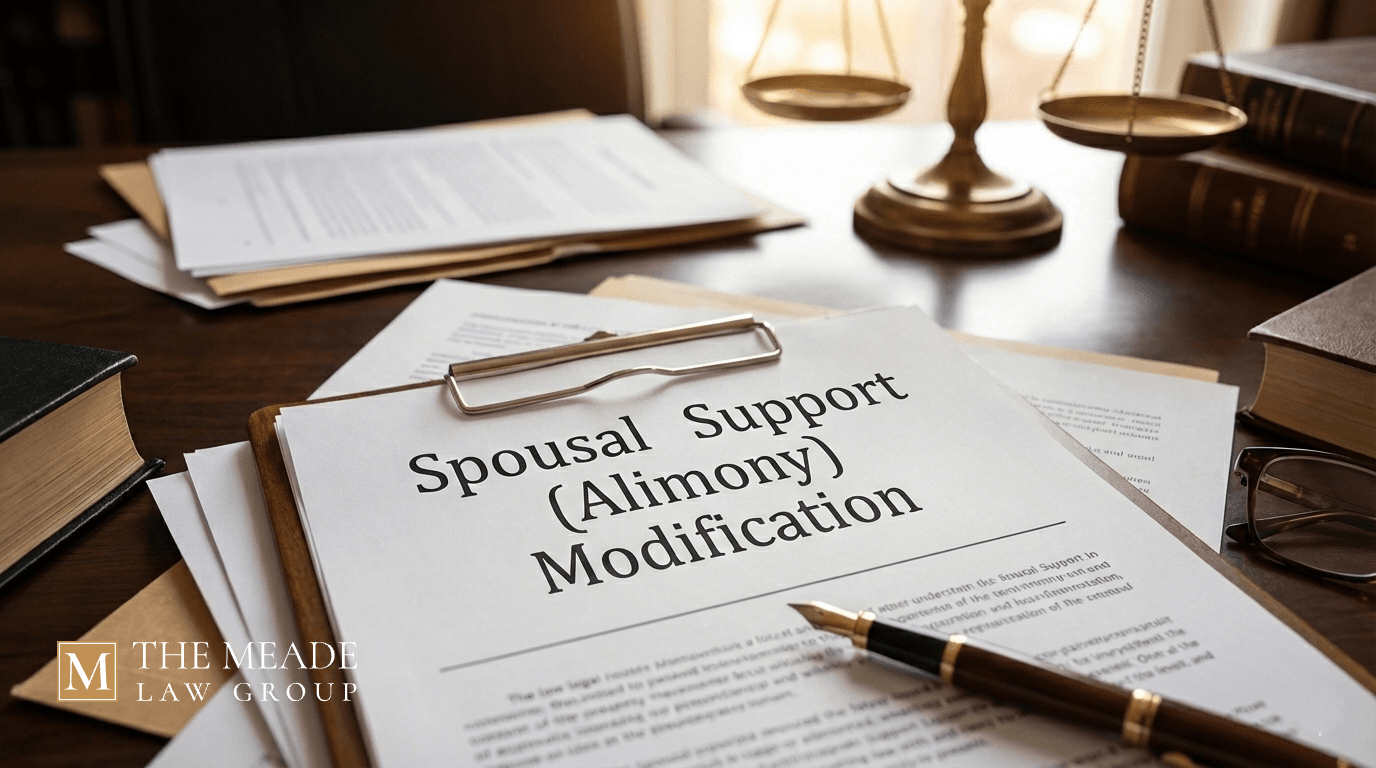For Ohio parents navigating divorce, few financial questions are as critical or as complex as determining financial contributions for post-secondary education expenses.
You already know that standard child support covers essential needs until your child turns 18 or graduates from high school. However, when university tuition, room, and board enter the picture, the rules shift dramatically, creating potential conflict and confusion.
This comprehensive guide from The Meade Law Group cuts through the uncertainty. We provide authoritative answers for parents across Columbus, Cincinnati, Cleveland, and throughout the state, ensuring you understand your obligations, your rights, and the legal strategies available to secure your child’s educational success.
Our focus is on the specific legal statutes and the judicial principles (case law) that govern post-secondary financial contributions in Ohio divorce and dissolution cases.
Understanding Ohio’s Legal Obligation for College Support
A common misconception is that all states mandate post-secondary financial support. It is crucial to understand Ohio’s distinct position on the matter.
Unlike states such as Massachusetts or New Jersey, Ohio does not impose an automatic, state-wide statutory duty on parents to fund their child’s college education after the age of majority.
The Statutory Rule: When Standard Support Ends
In Ohio, the core child support obligation is explicitly defined by Ohio Revised Code (ORC) § 3119.86. This statute dictates that financial responsibility typically terminates when the child:
Turns 18 years old, AND
Ceases attending an accredited high school on a full-time basis.
Crucially, the obligation terminates at the later of these two events. For example, if a child turns 18 in May but graduates from high school in June, support continues until the June graduation date.
Once this statutory termination event occurs, a parent is generally no longer legally required to provide financial assistance for college costs unless a court has specifically ordered it or the parents have previously agreed to it in writing.
The Discretionary Power: Court-Ordered College Support
While no automatic mandate exists, Ohio courts retain significant equitable powers in domestic relations cases. However, this discretion is not unlimited.
This power is drawn from Ohio Revised Code § 3109.05, which grants judges the authority to order contributions for college or vocational education if deemed appropriate.
This discretionary power is based on the principle of fairness, specifically the judicial inquiry: “Would this child have attended college and received financial support had the family remained intact?”
The court is essentially looking to maintain the status quo and ensure the child’s opportunities are not diminished by the divorce. The court’s authority to issue such an order is typically contingent upon one of two scenarios:
Parental Agreement: The parents entered into a separation agreement or shared parenting plan that explicitly provided for college support, which the court then adopted and incorporated into the divorce decree.
Judicial Finding of Appropriateness: The court finds that such an order is appropriate based on the factors outlined in ORC § 3109.05(A)(4) and the specific circumstances of the case, primarily to address the child’s educational needs or special circumstances.
Key Factors Courts Review Before Ordering College Support
When exercising their discretion under R.C. 3109.05, or when enforcing a parental agreement, Ohio courts analyze several critical factors established through case law (judicial precedent). It is vital to understand that these factors and related formulas are judicial benchmarks and common negotiation terms, NOT mandates explicitly defined in the Ohio Revised Code.
Courts do not issue these orders lightly; the moving party (the parent requesting the support) must present compelling, objective evidence for each factor to justify the use of the court’s equitable power.
Factors Guiding Judicial Discretion
Child’s Academic Ability: The court must see evidence of college readiness. This includes demonstrating a strong aptitude for higher education, such as high school GPA, standardized test scores (ACT/SAT), letters of acceptance from accredited institutions, and evidence of full-time enrollment.
Parents’ Financial Capacity: The court undertakes a thorough review of each parent’s financial resources, assets, and ability to pay without undue hardship. The court seeks to ensure the burden is equitably distributed based on income.
Pre-Divorce Standard of Living and Intent: The court assesses if college was a reasonable family expectation and intent before separation. Did the family save in 529 plans? Did the parents attend college? Was the child steered toward college preparatory courses?
Child’s Financial Contribution: The student is typically expected to take maximum responsibility for their own education. Parental contribution is generally considered the last resort, after all available grants, scholarships, and student loans have been applied for.
Prior Parental Agreements: The legal weight of existing divorce decrees or enforceable written settlement agreements is paramount. If parents agreed to specific terms (e.g., splitting tuition 50/50) and the agreement was incorporated into a court order, the court will typically enforce those terms, overriding general statutory rules.
Calculating and Limiting Parental Contributions (Common Practice)
Unlike standard child support, college support has no fixed statutory formula in Ohio. Courts use broad discretion, but the following benchmarks are the most common methods used in judicial orders and private settlements to determine the share of the net cost.
The Income Proportionality Method (A Common Benchmark)
This method is frequently used by judges and parents alike because it is considered the most equitable way to split the residual cost, but it is NOT a requirement of the ORC.
Determine Combined Income: Sum the annual gross income of both Parent A and Parent B.
Calculate Percentage Share: Determine each parent’s proportional share of that combined income (e.g., if Parent A earns 60% of the combined total, their share is 60%).
Calculate Net Cost: Subtract all grants, scholarships, federal aid, and the child’s expected contribution from the Total Costs (Tuition, Fees, Room, Board). This results in the Net Annual Educational Cost.
Apply to Net Cost: Apply the calculated percentage share to the child’s Net Annual Educational Cost.
Example (Illustrative of a Common Settlement Term):
Combined Income: $150,000
Parent A Share: 60% ($90,000)
Parent B Share: 40% ($60,000)
Net Annual Educational Cost (after aid): $20,000
Parent A Contribution: 60% of $20,000 = $12,000
Parent B Contribution: 40% of $20,000 = $8,000
Crucial Caps and Limitations (Negotiated or Judicially Imposed)
To ensure fairness and reasonableness, Ohio courts frequently impose limitations on support orders to protect parents from financial ruin and prevent students from choosing overly expensive schools without consequence. These limitations are based on judicial precedent and are almost always included in private agreements.
Cost Cap: The In-State Public University Benchmark: The most common limitation. Courts will often limit the required parental contribution to the average cost of attendance (Tuition, Room, Board) for an in-state public university (e.g., The Ohio State University or Miami University). This is applied even if the child attends a private or out-of-state school. The excess cost becomes the child’s or the requesting parent’s sole responsibility.
Duration: Limiting the support to a maximum duration, often four to five academic years (8 to 10 semesters), to encourage timely graduation.
Academic Progress Clause: Requiring the student to maintain satisfactory academic progress (typically defined as a GPA of 2.5 or higher and full-time enrollment) to continue receiving contributions. Failure to meet this requirement often results in an automatic suspension or termination of the order.
Age Limit: Support typically cannot extend past the child’s 23rd birthday, even if they are still in school, though this can be negotiated otherwise in a private agreement.
Covered vs. Excluded: Types of College Expenses in Ohio Orders
When a court orders college support, the obligation is designed to cover essential costs that ensure academic success. However, it is not a blank check for all student expenses. The court’s primary objective is to cover the educational necessity.
College Expenses Typically Included in Ohio Support Orders
These costs are generally considered essential for the child’s academic success and are often subject to a court-imposed cap (as determined by judicial precedent or agreement).
Tuition and Mandatory Fees: The core cost of attendance charged by the institution.
Room and Board: Costs for on-campus housing and meal plans, or an equivalent allowance for necessary off-campus rent. This is often capped at the cost of an in-state public university.
Required Books and Academic Supplies: Textbooks, lab fees, and specific materials required for coursework.
Necessary Technology: Items like a required laptop or specialized software are essential for the declared major.
Health Insurance: If the child is not covered by a parent’s existing plan, the cost of a student health plan may be included.
Expenses Typically Excluded (Non-Essential)
Courts generally do not cover these items, as they fall outside necessary educational costs. Parents must clarify these exclusions in their separation agreement to prevent post-decree disputes.
Luxury, off-campus housing, or high-cost single apartments.
Fraternity or sorority dues and related social expenses.
Excessive entertainment or non-academic-related travel (e.g., Spring Break).
Expensive vehicle payments, gasoline, or vehicle insurance.
High-end electronics (e.g., gaming consoles) that are not required for coursework.
Personal spending money, clothing, and non-essential furniture.
Planning Ahead: Securing College Expenses in Your Divorce Settlement
The single most effective way to prevent future disputes, legal fees, and financial stress is to address college funding during your initial divorce or separation negotiations.
A well-drafted agreement supersedes general Ohio law (ORC § 3119.86) and provides binding clarity for two decades. This is why most college support obligations in Ohio originate from a parental agreement rather than a contested judicial order.
Key Elements for an Effective College Agreement
A comprehensive college support clause should function as a standalone financial plan for post-secondary education.
Contribution Framework: Clearly define the specific percentage or dollar amount each parent will pay. Example: Parents will split the Net Annual Educational Cost 50/50, capped at the OSU in-state tuition rate.
School Selection: Establish the criteria for selecting a college. Example: Automatic agreement to fund any Ohio public university cost, requiring joint written approval for any private or out-of-state institution.
Communication and Transparency Protocol: Detail how grades, financial aid applications (FAFSA/CSS Profile), expense invoices, and scholarship notifications will be shared. Include a timeline for document submission. This minimizes accusations of non-cooperation or hidden costs.
Duration & Conditions: Explicitly state the maximum years of support (e.g., 4 years, or 8 semesters) and the required GPA/full-time enrollment status. Define the process for a gap year.
Payment Mechanism: Define whether payments are made directly to the university (preferred), reimbursed to the child, or reimbursed to the other parent. Establish payment deadlines (e.g., 15 days before the semester tuition deadline).
Modifying or Enforcing an Existing College Support Order
Once a specific college support obligation is incorporated into an Ohio court order (either through judicial discretion or a parental agreement), it becomes a legally binding directive.
However, life circumstances change, and Ohio law recognizes the necessity of adjusting these existing orders, just as it does with standard child support.
Valid Reasons for Modification
To successfully modify college support order terms, the moving party must file a motion demonstrating a substantial change in circumstances that makes the original order inequitable or unenforceable. Valid reasons include:
Parental Income Change: A significant, involuntary shift in either parent’s financial condition, such as a major job loss, disability, or a substantial reduction/increase in income. This must materially affect the parents’ ability to meet the ordered parental contribution.
Child’s Status Change: Changes in the student’s academic or enrollment status. Valid reasons include: the child withdraws from college; they significantly drop their GPA below the required minimum (e.g., failing to maintain a required 2.5 GPA, if that was agreed upon); or they cease continuous full-time enrollment.
Cost Change: A substantial, unexpected increase in tuition, or the award/loss of significant scholarships/grants, which materially alters the Net Annual Educational Cost covered by the parents.
Critical Warning: You must continue making payments per the current order until the court formally issues a new, modified order. Stopping payments unilaterally constitutes a violation of a court order and can lead to serious contempt charges and financial penalties, regardless of your justification.
Enforcement Tools for Non-Payment
If a parent fails to meet their court-ordered obligation for post-secondary education support, The Meade Law Group can initiate robust enforcement proceedings. Ohio courts offer powerful legal tools to compel compliance:
Wage Garnishment: A court order is issued to the non-paying parent’s employer to intercept income directly from their wages and remit it to the obligee or the university. This is one of the most effective tools.
Tax Refund Interception: The court can order the seizure of both state and federal tax refunds to satisfy the outstanding college support obligation.
Contempt of Court: This is a serious judicial action. The court seeks penalties against the non-paying parent, including significant fines, payment of the other parent’s attorney’s fees, and potentially, jail time for willful refusal to comply.
Property Liens: A legal claim can be placed against the non-paying parent’s real estate (e.g., their home). This lien must be satisfied before the property can be sold or refinanced.
Take Control: Seek Authoritative Legal Guidance
Navigating the legal complexities of Ohio child support for college expenses is often the most emotionally and financially stressful part of a divorce. You don’t have to face the uncertainty of R.C. 3109.05 or the threat of enforcement alone.
Consulting with an experienced family law attorney is the single most important step to achieving clarity, confidence, and a practical solution.
Partnering for Success
An attorney doesn’t just offer advice; they provide experienced guidance and legal support. Our team can help you:
Protect Your Rights: Ensure your financial situation and pre-divorce standard of living are accurately represented in court when addressing child support and related obligations.
Prevent Future Disputes: Assist in drafting clear, legally enforceable agreements regarding financial responsibilities, including provisions for post-secondary education if appropriate.
Ensure Compliance: Guide on modifying existing child support orders if circumstances, such as income or the child’s educational status, change significantly.
At The Meade Law Group, our family law attorneys are committed to providing personalized, practical representation in Columbus, Cincinnati, Cleveland, and surrounding Ohio communities.
Focus on securing your child’s educational opportunities while maintaining clarity and peace of mind regarding your financial obligations.
Contact The Meade Law Group today for a confidential consultation.


